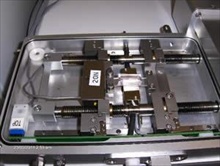Channels
Special Offers & Promotions
Linkam tensile stage chosen to control stress in growth of human collagen by the University of Liverpool
 Market
leaders in temperature controlled microscopy, Linkam Scientific Instruments,
have been chosen by the Physics Department of the University of Liverpool to
study the effects of controlling stresses applied during the growth of collagen
secreted from human fibroblast cells.
Market
leaders in temperature controlled microscopy, Linkam Scientific Instruments,
have been chosen by the Physics Department of the University of Liverpool to
study the effects of controlling stresses applied during the growth of collagen
secreted from human fibroblast cells.The research goal of Senior Research Assistant, Dr Caroline Smith, and her colleagues at the University of Liverpool is to advance the treatment of tendon injuries by developing a method of growing oriented human collagen.
To achieve this and to gain a fundamental understanding of the process, Dr. Smith is using the optical technique of reflection anisotropy spectroscopy to monitor the extent to which collagen, grown by mouse fibroblast cells on elastomeric substrates, is oriented when subjected to a regular uniaxial stress mounted in a Linkam TST350 tensile stage.
For the experiment, small wells capable of holding liquid were fabricated from polydimethylsiloxane (PDMS) to fit in the Tensile Stress Tester. The effect of stretching the PDMS as a function of applied stress was investigated initially to determine the effect of stress on the substrate. (J. Phys. D: Appl. Phys. 43, 245301 (2010)). L929 murine fibroblasts cells were cultured at 37?C in a 5 % CO2 atmosphere in Dulbeccos Modified Eagles Medium (DMEM) (Sigma) supplemented with 5 % Foetal Bovine Serum (Invitrogen) and 1 % Penicillin/Streptomycin antibiotics (Sigma). The culture medium was replenished daily during the cycling period. The cells were then subject to cyclic stress for 7 days. After 7 days, the wells were removed from the incubator and washed with Dulbecco's Phosphate Buffered Saline (DPBS, Sigma). The cell layer was dispersed in 0.05 % Trypsin/EDTA (Sigma) incubated for 3 min and subjected to gentle agitation to remove the cells without damaging the collagen layer. After removal of the cells the collagen secreted from the cells could be investigated by optical microscopy and reflection anisotropy spectroscopy.
The ability to choose a wide range of cyclic speeds to relate back to the growth of collagen is very useful. Initially, Dr Smith thought about making her own TST but having a small unit that could control the cyclic stress and also measure stress/strain curves at the same would be very difficult to manufacture in-house. Hence, the Linkam unit was purchased.
The TST350 stage is built with two precision ground stainless steel lead screws to maintain perfect uniform vertical and horizontal alignment. The sample jaws move in opposite directions to maintain sample in both reflected and transmitted microscope fields of view. Temperature control and accuracy is excellent with a range from -196°C to 350°C with 0.01°C control and up to 30°C/min rates, with virtually no temperature feedback to the measurement of force. Samples can be quickly loaded into the jaws and a test run can be performed in seconds. The data feedback from the force transducer, designed and built in-house, can be used to display an online plot of the force/distance when the jaws are moving at constant speed or when speed is varied to maintain a constant force. The speed of the jaws, force applied and distance moved can all be varied relative to the cell temperature. The sample chamber is sealed and can be controlled with various inert gases via the precision click fit valves built onto sides of the stage.
Visit the Linkam website (www.linkam.co.uk) today and learn about the broad range of applications in the field of temperature controlled microscopy.
Media Partners


